- Home
- Tim Lebbon
Relics--The Folded Land
Relics--The Folded Land Read online
CONTENTS
Cover
ALSO AVAILABLE FROM TIM LEBBON AND TITAN BOOKS
Title Page
Copyright
Dedication
1
2
3
4
5
6
7
8
9
10
11
12
13
14
15
16
17
18
19
20
21
22
23
24
25
26
27
28
29
30
31
32
33
34
35
36
37
38
39
40
Acknowledgements
About the Author
ALSO AVAILABLE FROM TIM LEBBON AND TITAN BOOKS
Coldbrook
The Silence
THE RELICS TRILOGY
Relics
The Folded Land
The Edge (forthcoming)
Alien: Out of the Shadows
THE RAGE WAR
Predator: Incursion
Alien: Invasion
Alien vs. Predator: Armageddon
The Cabin in the Woods
Kong: Skull Island
THE FOLDED LAND
Print edition ISBN: 9781785650314
Electronic edition ISBN: 9781785650345
Published by Titan Books
A division of Titan Publishing Group Ltd
144 Southwark St, London SE1 0UP
First edition: March 2018
2 4 6 8 10 9 7 5 3 1
This is a work of fiction. Names, places and incidents are either products of the author’s imagination or used fictitiously. Any resemblance to actual persons, living or dead (except for satirical purposes), is entirely coincidental.
Copyright © 2018 by Tim Lebbon. All Rights Reserved.
No part of this publication may be reproduced, stored in a retrieval system, or transmitted, in any form or by any means without the prior written permission of the publisher, nor be otherwise circulated in any form of binding or cover other than that in which it is published and without a similar condition being imposed on the subsequent purchaser.
A CIP catalogue record for this title is available from the British Library.
Did you enjoy this book?
We love to hear from our readers. Please email us at [email protected] or write to us at Reader Feedback at the above address.
To receive advance information, news, competitions, and exclusive offers online, please sign up for the Titan newsletter on our website
www.titanbooks.com
This one is for my yearly walking buddy,
the magnificent Guy Adams
1
There were three men running toward him. He stood his ground as they dashed past, and ignored their panicked, shouted warnings, swapping a glance with one of them. There was sheer horror in the man’s eyes.
Gregor smiled. He’d come to the right place.
He walked on toward the source of their terror. It was a direction he was used to taking. When there was fear amongst people, that was where he often found what he was searching for. Sometimes those frightened people thought of him as a kind of savior, that he had come to rescue them from things with teeth and claws, and faces unlike their own. He did nothing to disabuse them of the notion.
They ran, he arrived, and the monsters went away.
Gregor had been watching the illegal logging camp for seventeen days, hiding out in the jungle, circling by day and hunkering down at night. He grabbed ten minutes of sleep here and there, but most of the time forced himself to remain awake. He’d been watching for signs, and didn’t want to miss anything.
The settlement was large. During the day it often took him ten hours to complete a full circuit of the rough camp and the logging operations that spread out from its heart. Down ravines, up steep hills, always alert for movement and careful not to be seen, he enjoyed the physical challenge. He liked pushing himself. The pain was cathartic. Nothing good came to those who did not strive.
The Amazon jungle was sweltering. Even the regular afternoon downpour was warm, but at least the water swilled a little of the stale sweat and dirt from his clothes, and he caught some in his hat to drink. He ate acai and figs from hanging branches, and sometimes he plucked grubs and spiders from damp, dark places in the bark of giant trees. The loggers would be destroying their habitats soon enough. At least he was putting their succulent, crunchy bodies to good use.
With his time here almost over, he felt a flush of satisfaction. It had been wise to wait and watch. The landscape felt right, the surroundings and location perfect, his information had been correct. He’d known that given time the loggers would uncover what he sought.
In the distance he heard mewling in the naked sunlight.
Gregor broke into a jog. In any normal jungle, moving at such speed would have been impossible, but this place was dying. He vaulted felled trees, climbed onto pale fleshy stumps, leapt off and kicked through thigh-high piles of chopped branches and lank vines. Skirting around a massive stack of stripped trunks, he almost ran into two more men who were running away. One of them skidded to a stop and grabbed Gregor’s arms, opening his mouth to shout a warning, snot running from his nose, sweat washing dirt and sawdust into his wide, terrified eyes.
The man saw something in Gregor’s expression that gave him pause, and the warning remained unvoiced. Pushing away, Gregor ran on, turning his head slightly from side to side, sniffing the air.
A machine idled nearby, sitting at the end of a trail of deep ruts in the jungle floor. Its caterpillar tracks had churned harsh wounds into the ground. Its heavy clasping claws held a tree horizontally, ready to drag it through a macerator that would chew off limbs, bark, and thick side branches, processing it for future use. It was a mechanical version of Gregor himself, albeit larger and far clumsier.
Gregor grinned at this comparison. It pleased him, and he laughed as he ran past.
A flock of birds took flight, startled by the sound.
He stopped at the edge of a large hole. It had once been home to the roots of a massive tree, now tumbled ready to be chopped. The upended root ball formed a tall wall to his left, and crawling blind things still scampered for shelter.
In the hole, the pale thing also tried to crawl back into dank shadows. Tropical sunlight hit its slick skin. Steam rose from its body. It looked up at Gregor. Perhaps it smiled, or grimaced, and the faint whisper might have been an attempted growl to see him away.
Gregor jumped into the hole and landed several feet away from the naked beast. It was the size of a small child, thin and weak-looking, despite its long limbs that seemed to flex and curl around it. It pulsed and moved as if unused to such exposure.
“You’re not afraid of me,” the creature said, the words sounding unfamiliar in its mouth. It must have been a long time since it had felt the need to speak.
“Should I be?” Gregor asked. He pulled a long curved knife from a sheath on his belt. It was razor sharp on its outer edge, the inner blade serrated for sawing through bone. Though well-used, it was still keen and clean. Gregor knew how to look after the tools of his trade.
The creature hissed, but the sound turned into a low, pained sigh.
“Poor leshy,” Gregor said, kneeling in the mud. “How long have you lain here?”
“Too long to remember,” the leshy said, eyeing
the blade. It was a tree spirit of this jungle, and it had used the living weight of this giant kapok tree to hide itself away. It might have been there for five hundred years.
Gregor reached out, not with the knife but with his free hand. He touched the creature’s slick brow and whispered words of comfort. Its heavy eyes drifted shut and it purred, twisting itself against his hand.
“Please don’t hurt me,” it said, and although its language was one that no human should know, Gregor understood.
“Tell me where you came from,” Gregor said.
“I’ve been here for…”
“Not here. Before here.”
The leshy opened its eyes again, onto a whole new world. Gregor saw a shred of understanding there now. He would have to be careful. This creature was weak, pitiful, but appearances could be deceptive.
“North,” the leshy said. “There were too many of us there. I came here to be on my own.”
“So sad,” Gregor said.
“Have you come to save me?”
“Yes,” Gregor said. “Yes, I have.”
The leshy blinked and its limbs curled in on themselves.
Gregor lashed out with his knife and sliced the creature’s throat. Its eyes snapped wide. He saw its surprise, but behind the surprise there was something else. Perhaps it was relief.
He cut again, reversing the knife and pressing down, sawing until the leshy’s head parted from its body. Above and around him a heavy sigh passed through the canopies of those trees that were still standing, but Gregor did not let such a thing distract him from his task.
He dug in deep and cut out the dying creature’s heart. As he held it up, sunlight touching where it never should caused the dripping organ to shrivel and cauterize.
A nearby tree began to shed its heavy leaves. Further away, several other trees collapsed with a grief-stricken roar.
“You’re saved,” Gregor said. He pocketed the heart, climbed from the hole, and started walking north.
* * *
Half an hour later he came across two of the men he’d seen fleeing. They were huddled in the cab of a truck, doors and windows closed despite the humidity and heat of the midday sun. They were smoking, their frightened faces hazy behind a miasma of fumes.
As Gregor passed by, one of them wound down his window, just a few inches.
“It’s gone?” he asked.
“Gone.” Gregor did not stop walking.
“What was it?” the man called after him.
“Amazing,” Gregor said, and he walked on, looking forward to leaving that awful fucking place.
2
When storms blew and raged, Sammi remembered her mother.
Mom had always enjoyed storms, and used to sit watching thunder and lightning from Sammi’s bedroom window seat, holding her daughter’s hand and telling her there was no reason to be afraid. Sammi once read about a football team being struck by lightning in Brazil. Six of them had died.
“You’ve got more chance of being eaten by a crocodile,” her mother would say.
“Here in Massachusetts?”
“Precisely.”
In truth, Sammi had never been afraid of lightning. The power and strength of those superheated bolts fascinated her. Hurrying along the street toward their riverside holiday home, Sammi kept away from the gutters. The storm drains weren’t that large here, but they were still big enough for a snapping snout to poke through.
It was a ridiculous thought, she knew, but it reminded her of her mom. That was another thing she’d said.
“You’ve got a vivid imagination, Sammi. It’s richer than most. Sometimes it might make you afraid, but that’s a small price to pay for knowing the world.” At the time Sammi had been too young to ask exactly what she meant, and later there were other things to talk about, but now she often wished she had. She’d never mentioned it to her dad. It was a private memory.
She was beginning to wish she’d come on the bike, as her dad had suggested. He’d already had a couple of beers, so couldn’t drive, and when Sammi had developed a sudden craving for Dunkin’ Donuts, and his face lit up at the idea of one of their coffees, the skies had just been overcast. If she’d taken the bike, she would have had trouble carrying the bag in one hand and steering with the other. And it was only a mile’s walk.
Then the skies opened, rain hammered down, and sizzling arcs of lightning clashed in the clouds above her. She huddled the paper bag to her chest to prevent it from getting soaked and falling apart. It contained four donuts and two steaming hot coffees in a cardboard holder. She wasn’t dressed for the weather, and she passed a few other people who’d been caught out by the sudden downpour, wearing shorts and tee shirts and dashing here and there. She swapped amused glances with some of them. One teenaged boy about her age smiled shyly. An older woman frowned, appearing confused at the storm.
It had come from nowhere.
Sammi didn’t mind. She wasn’t afraid of thunder and lightning, because her mother had told her not to be. Trying to know the world honored her memory. So did not being scared of the storm.
Besides, the rain was warm on her skin, the smell of a summer downpour sweet, and she still had six more glorious days on Cape Cod.
“Hey, Sammi, hope the donuts are worth it!” Mrs. S. called from her front porch. Sammi smiled and waved back, still trying to shelter the bag with her body. Mrs. S. was a huge, round woman who seemed to spend morning, noon, and night sitting on her porch, watching the world go by and swigging soda from a glass the size of a fishbowl.
Sammi had never known her as anything other than Mrs. S., and Dad claimed not to know her real name. They only came to the Cape Cod house two or three times each year, and their interactions with their large neighbor rarely went beyond a wave and a comment about the weather. That Mrs. S. knew their names didn’t faze them. She was a permanent resident, and the sort of person Sammi’s mother had called a sponge, sitting out there and soaking up information whether offered openly or not.
Sammi felt like a sponge. She was soaked through, and would have to change before dinner. At the entrance to the winding road that led down to the inlet’s edge, she felt the bag beginning to split. She hugged it close, both hands folded beneath it to hold in the contents.
Another great crack of thunder smashed across the sky, lightning flashing immediately overhead, so powerful that she felt it thud against her chest. Sammi paused, looking up and around. Rivulets of water ran across the lane and the normally dusty surface was dark and soaked, muddy puddles growing here and there. The river would be flowing faster in the morning, and heavy with sediment. Pity. She’d been hoping for an early morning swim.
It didn’t matter, really, because she and her dad would take a day trip, instead. The trouble was, everywhere they went across the Cape reminded them of her mother.
The house was owned by her mother’s side of the family. A couple of times they’d all come here together, crowding into bedrooms and enjoying a big family get-together.
Then her Aunt Angela went to Britain, and…
Sammi had never believed any of the stories about Angela and her boyfriend. Neither did her dad. Sometimes the news reminded them, but she and Dad no longer talked about the couple.
“Too painful,” he said. Too many lies, Sammi thought. There was a pause button pressed in her life, one branch blocked, and something inside told her that one day, it would be unpaused, and the truth would play out.
Despite that, the house was bursting at the seams with fond memories, the scene of many of her first real recollections. They’d taken regular vacations there every year since she had been born fourteen years before, and she could scroll through the times in that house like a flip-book of images showing her growing up. Barbecues in the garden, playing softball on the lawn, jumping from the dock into the inlet, paddling the inflatable kayak that had somehow lasted nine summers and the abuse of family members and friends. Watching TV in the warm, humid evenings, sitting in her favorite wicker chai
r while her parents shared the sofa and a bottle of wine, or sat out on the patio, the warm murmur of their voices a comfort behind cartoon chaos or Disney frolics.
Sitting in the window seat with her mother, watching lightning dance across the ocean horizon to the south.
Her mother had died six months earlier, in a car accident. This was their first time here without her, and the house seemed larger than before, harder to fill. She knew that her dad was still struggling. He’d aged years over the past few months, and he was quieter now, more prone to long periods of silence staring at nothing.
Sammi knew what he was looking at.
Splashing through puddles, she was no longer concerned about how wet her tennis shoes became, and giggled at the memories of doing this as a child. There must have been a last time she’d ever jumped into a puddle and thought it fun. The next time she’d walked around them, not wanting to get her new jeans wet, or conscious that her parents would roll their eyes, more concerned with the laundry they’d have to do than the enjoyment she was having. She supposed these last times doing childish things were a part of growing up, and it was sad that they happened and drifted by unnoticed. If she noticed when they came, she would relish every one.
She passed a couple of houses on her left and right, each in its own generous yard with an entrance lane, fencing, and trees and hedges planted to identify the garden boundaries. These were also holiday homes, and she’d never got to know the people staying there.
Lightning flashed again. Thunder cracked. She wondered where it struck, and whether another tree had just died.
As she neared the driveway to the house she saw her father huddled under an umbrella and waiting for her on the porch. He waved and moved out toward her, smiling broadly. She smiled back. There was something about an unexpected, unforecast storm like this that was exciting, and she was pleased to see he shared her pleasure.
She passed their parked car, and when they were within hailing distance she heard him shout. “You better not have spilled my—”
Something changed. The moment froze. For an instant quicker than a blink Sammi was aware of her surroundings with a stark, utter clarity. Her father partway across the garden toward her, one foot raised, mouth open mid-sentence. The house behind him, lights casting shadows across several windows, paint flaking from wooden siding, rose trellis heavy with summer blooms. Rain hanging in the air like glass shards, catching light from the house and reflections from elsewhere. If I look closely enough I’ll see myself in every raindrop, she thought.

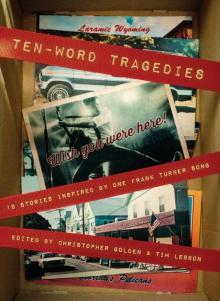 Ten-Word Tragedies
Ten-Word Tragedies Predator: Incursion
Predator: Incursion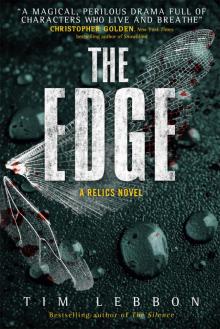 Relics--The Edge
Relics--The Edge Firefly
Firefly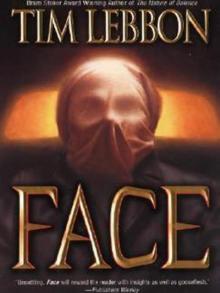 Face
Face Generations
Generations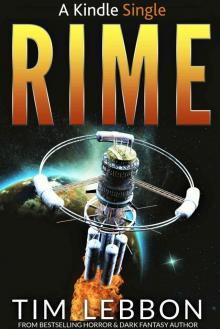 RIME (Kindle Single)
RIME (Kindle Single) Fallen
Fallen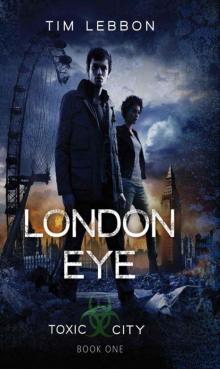 London Eye tc-1
London Eye tc-1 Kong: Skull Island
Kong: Skull Island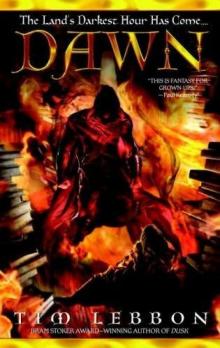 Dawn n-2
Dawn n-2 Into the Void: Star Wars (Dawn of the Jedi)
Into the Void: Star Wars (Dawn of the Jedi) The Everlasting
The Everlasting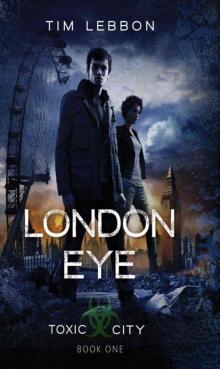 London Eye: 1 (Toxic City)
London Eye: 1 (Toxic City)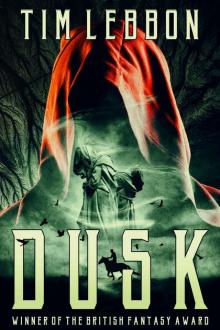 Dusk: a dark fantasy novel (A Noreela novel)
Dusk: a dark fantasy novel (A Noreela novel)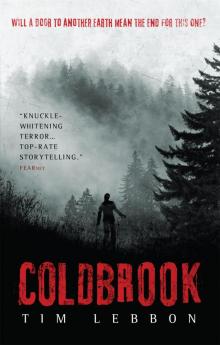 Coldbrook
Coldbrook Alien
Alien Dusk
Dusk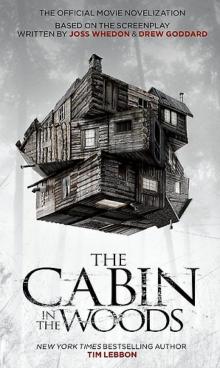 The Cabin in the Woods
The Cabin in the Woods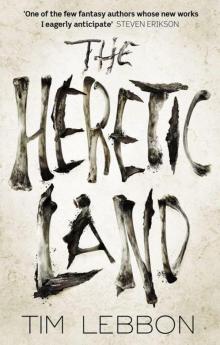 The Heretic Land
The Heretic Land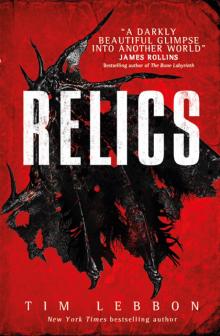 Relics
Relics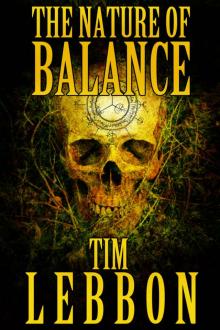 The Nature of Balance
The Nature of Balance Echo City
Echo City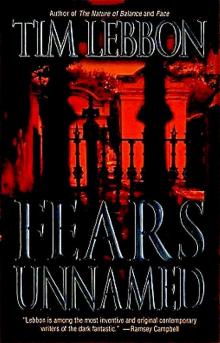 Tim Lebbon - Fears Unnamed
Tim Lebbon - Fears Unnamed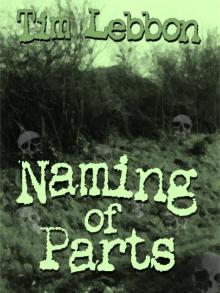 Naming of Parts
Naming of Parts Alien--Invasion
Alien--Invasion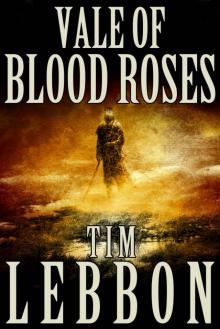 Vale of Blood Roses
Vale of Blood Roses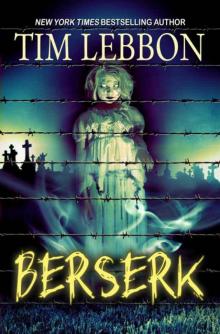 Berserk
Berserk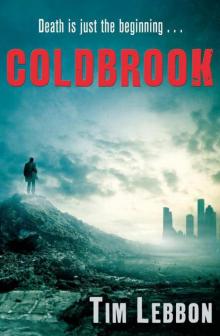 Coldbrook (Hammer)
Coldbrook (Hammer)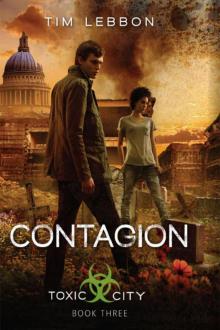 Contagion tc-3
Contagion tc-3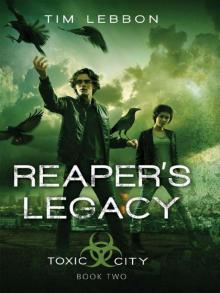 Reaper's Legacy: Book Two (Toxic City)
Reaper's Legacy: Book Two (Toxic City)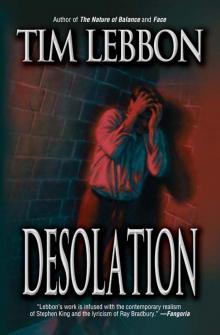 Desolation
Desolation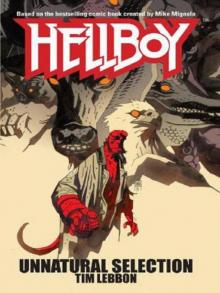 Unnatural Selection
Unnatural Selection Predator - Incursion
Predator - Incursion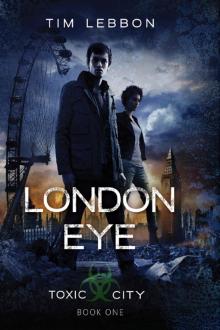 London Eye
London Eye Contagion (Toxic City Book Three)
Contagion (Toxic City Book Three) The Silence
The Silence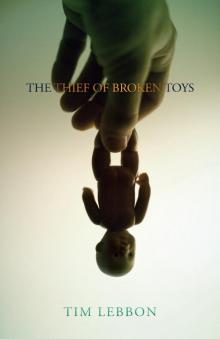 The Thief of Broken Toys
The Thief of Broken Toys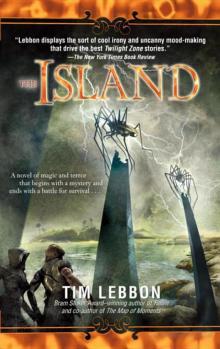 Tales of Noreela 04: The Island
Tales of Noreela 04: The Island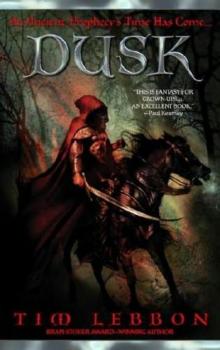 Dusk n-1
Dusk n-1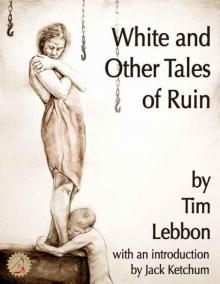 White and Other Tales of Ruin
White and Other Tales of Ruin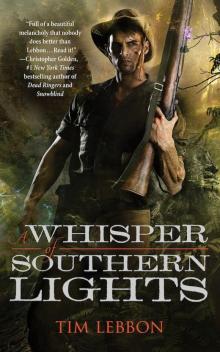 A Whisper of Southern Lights
A Whisper of Southern Lights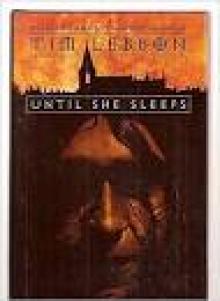 Until She Sleeps
Until She Sleeps Relics--The Folded Land
Relics--The Folded Land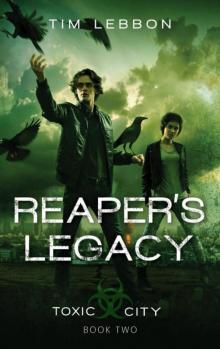 Reaper's Legacy tc-2
Reaper's Legacy tc-2 Alien: Out of the Shadows
Alien: Out of the Shadows Pieces of Hate
Pieces of Hate X-Files: Trust No One
X-Files: Trust No One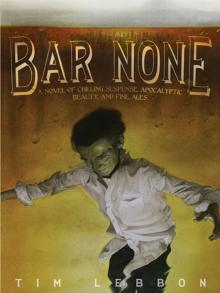 Bar None
Bar None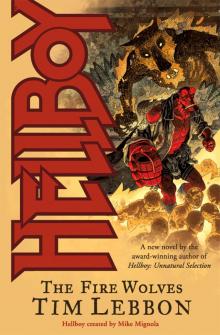 The Fire Wolves
The Fire Wolves